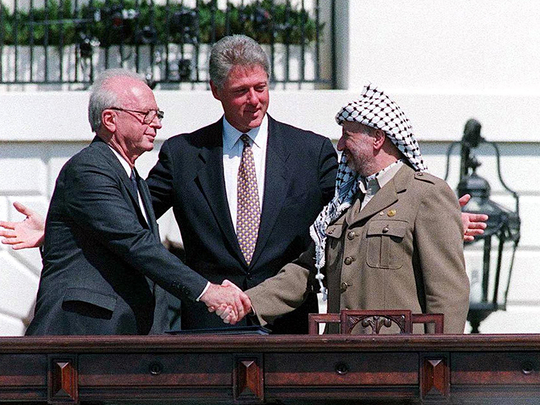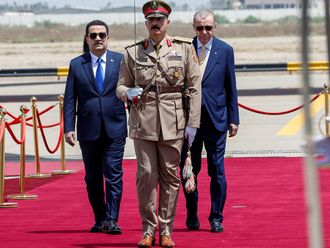
Dubai: Gassan Al Khatib, a former member of the Palestinian delegation at the peace talks that were going on in Washington in parallel to the secret negotiations in Oslo in 1993, still recalls the Palestinian reaction to the back-channel talks.
Those involved in the formal talks, including Al Khatib, “didn’t like the fact that there were many back-channel negotiations they were unaware of”.
They opposed it and Al Khatib refused to attend the signing ceremony at the White House on September 13, 1993.
“Oslo Accords were really a mistake. I believe the Palestinian leadership made a big mistake by agreeing to it,” Al Khatib told Gulf News.
“The Oslo agreement was a bad agreement and Palestinians did not have to go for such a deal. Had the [formal] talks in Washington, which followed the Madrid peace conference, continued, we would have ended up with either a better deal, or a status quo and that would have been better for us. But Oslo was a mistake,” said Al Khatib, who has held several positions in the Palestinian National Authority that were established after the signing of the deal.
The Oslo talks, which took place in a two-floor house located on a hilltop in the Norwegian capital, were held in top secrecy and under tight security. People working at a restaurant a few metres away from the building told Gulf News that at that time they were unaware of the meeting.
Al Khatib, who runs a polling and survey centre, said at that time most Palestinians were optimistic the deal would signal an end to their suffering.
“The opinion polls [in 1993] showed that 70 per cent of Palestinians supported the deal. This went on going downwards until it reached 26 per cent in a poll conducted in March this year,” he explained.
According to analysts, Palestinians saw in the deal a prelude to the independent state they had dreamt of and fought for. However, today, when they look back, they say its lack of a clear timetable and details hindered the implementation of the accord. Also, the US bias towards Israel and Washington’s monopoly of sponsorship of the talks hindered achievement of results. Other reasons relate to the “drastic changes” inside Israel, and its shift to the extreme right, coupled with “weak Palestinian performance”, analysts said.
Oslo postponed talks on the most difficult and sensitive issues to the final stage that never came. Those issues included borders, water, refugees, security and the fate of occupied East Jerusalem. Last May, the Trump administration recognised occupied Jerusalem as the capital of Israel. The Palestinians, on their part, want occupied East Jerusalem as the capital of their future state
“In my view, Oslo was sort of an escape by [late Palestinian leader Yasser] Arafat from a bitter Arab reality,” said Khattar Abu Diab, from the Paris-based Council on Geopolitics and Perspectives. He said some Arab regimes that took tough positions against Israel, including Iraq, Libya and Syria, sought to have control over the Palestinians. Arafat thought he could improve the outcome of Oslo, but that was difficult.”
However, according to political scientists, Oslo did achieve some goals for the Palestinians. It established “for the first time, a Palestinian entity inside a part of historical Palestine, the PNA, regardless of the size of that piece”, said political scientist Tarek Fahmy, who also heads the Israeli unit at the National Centre for Middle East Studies in Cairo. It also defines “temporary borders” between the Palestinians and Israelis.
On the other hand, it failed in implementing other parts of the deal and was unsuccessful in defining the responsibilities of each side, he said.
“It was more than autonomy, but less than a state,” Fahmy said. He believes today “no one will dare dissolve the PA, because the alternative is total chaos”.
However, from an Israeli perspective, the regime won recognition from Palestinians. Palestinians recognised Israel’s right to exist, and Israel recognised the PLO as the sole legitimate representative of the Palestinian people, in line with the Oslo Accords.
“That was a golden and unique recognition,” said Palestinian analyst Khalil Shaheen. “No freedom movement ever gave a recognition to the occupying force to stay on its land,” Shaheen told Gulf News.
There are currently discussions among Palestinians to suspend that recognition. There are also calls to stop the ongoing security dealings between the Palestinians and both the US and Israel.
On Monday, Washington ordered the PLO in Washington to close by October 10. The decision was taken on the anniversary of 9/11 terrorist attacks in the US. Palestinian analysts said security coordination should end.
“If the US is considering the Palestinians as terrorists, they should receive the message that they shouldn’t ask and expect from the Palestinians help and information in their fight against terrorism.”











